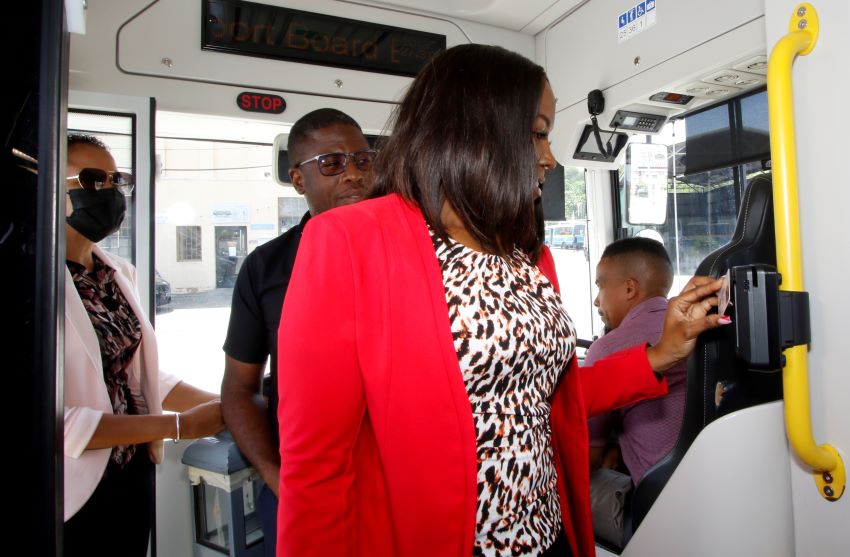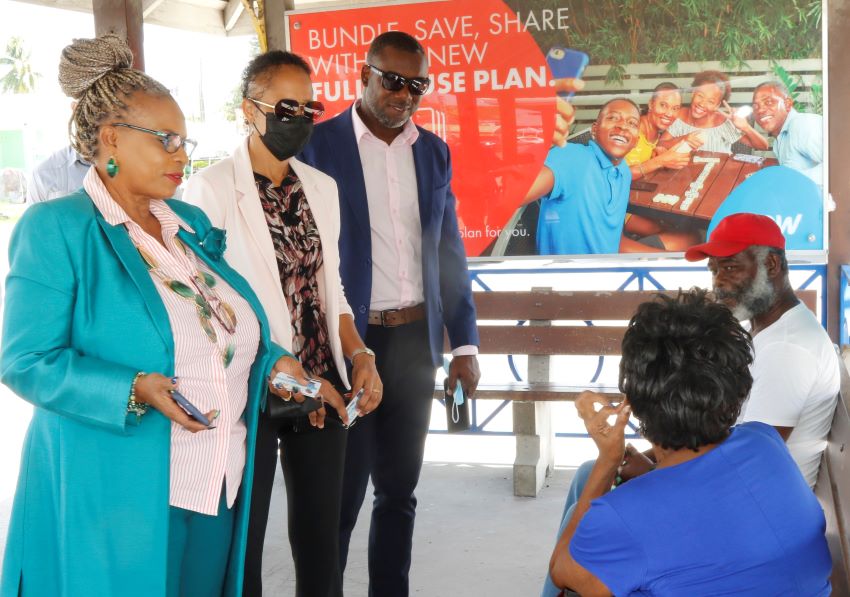
Public testing of the Transport Board’s new automated cashless payment system has begun.
On Wednesday, October 26, 2022, Deputy Prime Minister and Minister of Transport, Works and Water Resources Santia Bradshaw, Parliamentary Secretary in the Ministry of Transport, Works and Water Resources (MTWW) Dr. Romel Springer along with the Chairman of the Transport Board René Butcher, board members, and top MTWW officials got a first-hand look at the new system.
After an in-house audio-visual demonstration, the party was facilitated on an electric bus fully outfitted with a card reader, and they were able to tap the payment cards for entry on board. As part of the test, the touring party stopped along the way and picked up random commuters who were given the opportunity to also test the new cashless system and offer their feedback.
Chief Operating Officer (COO) of the Transport Board, Lynda Holder was on hand to answer questions and explain how the cashless payment system is expected to work.
“Some of the questions from the public commuters included: How will you top up the card? Will the card totally replace cash on board the bus? Will it be linked to the new Trident ID cards? Are there options for you to be able to use it on your phone, or can you have multiple cards like how you have multiple bank cards? We were pleased to be able to answer yes to nearly every one of those questions and we saw the card in action,” she said.
Mrs. Holder said commuters would be able to put a certain amount of dollars on the card so that they could plan how much money they wish to spend on travel for a specific period.
She added that every time the card is tapped on board the bus, the fare would be reduced from the total amount of money on the card. Furthermore, the facility also allows for multiple users on one card. “So, it can be me and my family and we can pass the card to the other person when they board the bus,” she stated.

The COO reassured the public that the cashless payment system would accommodate all categories of commuters including old-aged pensioners, who would still be able to travel free on the bus as the cards would be linked to the new Trident Identification cards. A component of the cashless payment system will also accommodate school children.
Mrs. Holder gave commuters the heads up that public testing of the new payment system would continue. “In the immediate future, you can expect to see us randomly on board with persons having the card to test it,” she said.
While testing is ongoing, a help desk session will be opened to answer any questions that may arise and to ensure the public is given as much information as possible on the new cashless payment system.
During the test on board, the Deputy Prime Minister and Minister of Transport, Works, and Water Resources engaged with the commuters who joined the officials along the route. She noted the feedback she received was positive.
“The elderly persons who joined us felt it was a step in a positive direction, many of them felt it will allow them not to have to hustle through their bags to find change to board the bus. The cashless system would also be beneficial for drivers of public transportation. They will have another level of comfort in terms of them being on buses for long periods and not having cash on the bus with them and having them exposed to the risk of having them robbed,” said the Deputy Prime Minister.
She believes that the new cashless system will not only be well received by the general public but that it is also a step in the right direction in the modernisation of the transportation system in Barbados.
